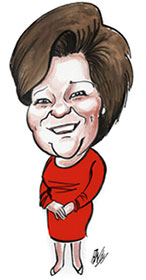Feelings….nothing more than feelings…. A song from the 70’s!! That dates me, right? Oh well! I can’t get it out of my mind now so we’ll see how it informs this week’s post.
The theme this week is feelings: how to own your own feelings without taking responsibility for the feelings of others.
Feelings: Giving Away Ownership
Are you someone who assigns your feelings to others? When a meeting ends and you feel your ideas weren’t heard, are you annoyed with your colleagues? OR, do you ask yourself how you can change your experience?
A client recently told me a story about being in a colleague’s office seeking advice. Realizing during one of our conversations that he’d experienced this person as disrespectful and sometimes competitive, he decided to take responsibility to reset the relationship. He was anxious about the moment knowing he had to take responsibility for acting inappropriately and perhaps unconsciously sabotaging one of her projects. A few minutes into the conversation, the phone rang and she picked it up. My client concluded she did this without giving him a thought. Even as he stewed, she turned to him and told him they would have to pick up their conversation another time. My client left the conversation angry. He had no desire, after this, to reset the relationship. For the next week, he actively sought to sabotage her projects and even her career or at least her reputation with their boss.
He was only bringing this incident to our conversations a couple of weeks later. He made a point of starting the story explaining why he had avoided bringing it up. His anger was coming from a feeling that he’d been belittled. He’d felt dismissed like a little boy. He was embarrassed by how he’d been treated and didn’t want me to know. He expressed his insight something like this, “This woman makes me feel like an idiot. Like I haven’t thought things through. It’s like she thinks she’s smarter than I am and we all know that’s not true.” He did add a few more choice words before apologizing to me for his outburst. One of my responses went something like, “you’ve assigned her a lot of power. What’s making it possible for her to make you feel this way?”
When we hand over responsibility for our feelings we give people power over us whether they know it or even accept it.
Taking Back Ownership
The first step is recognizing when you’ve given up ownership of your feelings. It happens all the time so you will find examples to learn from every day. Just this week as I’ve been playing with this theme I’ve had plenty of moments. The first that tested me was a demanding call from my mom on Monday morning that escalated to exchanges with siblings. I was very aware of how old feelings were triggered. Feelings about how I am taken for granted and expected to be the one to ‘step up’ and solve a dilemma. I had another with a friend in the gym where I expected support to process a disappointing piece of news but felt like I was being judged.
Taking back ownership of your feelings isn’t easy. It does, however, offer insights and learning. If you want to live an examined and insight-driven life, it’s worth doing the work. Below are 3 ways to get started.
- Notice when someone triggers a feeling in you with something they say or do. Instead of reacting, ask yourself, what is it about what they’re saying or doing that is causing me to feel this?
- Check out whether your interpretation of what is being said or done may be clouded by other things that are happening in your life? OR, perhaps their words or actions are more about what is happening in their life. (By the way, my client in the story I told early, learned more about the phone call his colleague accepted while he was in her office three weeks later. Her father was in palliative care and the attending nurse was calling.)
- Ask yourself what skill you could build to reduce the impact of these situations. Below, in relationship to a different story I share a three step process to building self-regulation as a habit.
Feelings: Taking Responsibility for Others’
We all are guilty from time to time of assigning ownership of our feelings to others as both the story above and the one revisited below reveal. It’s also very common for some of you to take responsibility for the feelings of others. This can be equally as hard on relationships and positive communication. When you accept blame for feelings others have, you tend to become really careful and even overly deferential.
Once, soon after moving into serve as President/CEO of a small company, I added a new Director position. My goal was to shore up what I observed as a weakness in the operation AND to add a fresh, diverse voice. Intentionally searching for a unique perspective and personality, I made a good hire, but it wasn’t obvious to everyone, at first.
This Director struggled to fit in. In role for just a year myself, when I hired her, AND knowing the Board took some heat from my senior team for hiring me, I wasn’t entirely surprised. After three months in role, this Director finally came to me to seek advice on how to engage more fully. While recognizing the signs of “push-back” in what she was experiencing, I was forced to acknowledge it was different. Given my role, and the natural deference that inspired, at least in my presence, we had to get intentional to solve this.
After a few conversations it became clear to me that this Director was adjusting her style and personality in hopes she would win their favour and eventually fit in. I asked her if she would be willing to chair a new committee with one stipulation: she had to be her full, authentic self and not “tone it down” to be safe. I attended a couple of meetings, in support, while we transitioned and then coached her from the side. The coaching was primarily about leveraging her bold personality rather than focusing on adjusting to “less than” for what she perceived as the feelings of others. Within 6 months, perhaps less, people started to see the unique value she added to the team and I watched her blossom in her skills and expand the impact she had.
More on the Client Story (Newsletter)
In this week’s newsletter, I tell a client story about how angry one of my clients was when feeling disrespected by a Manager who defied a direct order from him as the President of the division. I encourage you to click over to it and read it. I promised to revisit here in the blog post. This leader who felt disrespected and extremely angry ultimately, when taking back ownership for his feelings, realized what he could learn. The skill he committed to building in himself as a result: self-regulation. A key skill required of leaders AND every responsible contributor to any project or work-group. What makes up self-regulation? Three basic elements:
- Establish behavioral standards. This Department Head realized he needed to build a habit of organizing his thoughts before expressing himself. He also decided to start working on a habit of entering a conversation with questions for understanding rather than catching people off-guard.
- Measure of performance. Once you know what these standards will look like specifically, how do you measure whether it’s working? This client decided he would organize his thoughts in writing as a way of tracking his intention. THEN, after every conversation, he’d self-assess; had he remained curious and in solution-mode rather than blame-mode.
- Adjust as needed. Once you’re paying attention to how you are managing your feelings AND tracking how you’re modulating your behaviour in response, you’re in a position to adjust, even in the moment when necessary. In this case, my client realized it was harder than establishing an intention. He had to build patterns in his language to help him live within the lines he had established. Over time he got better at adjusting when old patterns emerged and eventually he found it became second nature. This client experiences a significant pay-off. Turn-over on his team started to drop. Now he uses that as a “lag” measure for himself and his entire department.
How Can I Help?
Self-regulation is a difficult skill to apply effectively. Listen to my BIG WHY Story on the services pages to hear what I learned.
Are you someone who just knows you can do great things but you just haven’t found your voice or your way in?
Do you struggle to feel valued in your workplace AND you just know when you figure it out, you will make a difference?
What needs to happen for you to feel capable of owning your own feelings AND not accepting responsibility for others’?
ARE YOU CURIOUS TO FIND OUT WHAT YOU ARE MADE OF AND HOW TO MAKE IT WORK FOR YOU?
Great – check out the upcoming workshop – “Resilience: it takes GRIT”. It’s affordable and very engaging. Learn more…
- on my website in the services section
- and register by checking out the Eventbrite page
- by registering for an ASK ROX RoundTable coming soon – it’s FREE OF CHARGE.
- Register for 1:1 or group coaching with me. Learn more on the related services page.
- Contact me to arrange a complimentary exploratory conversation
- Book me to speak at your conference or to a group in your organization.



